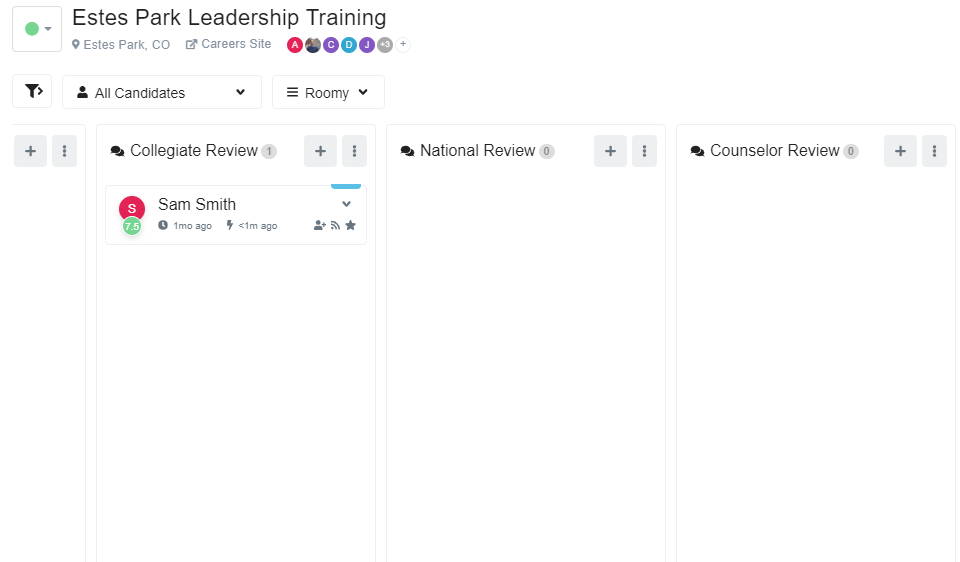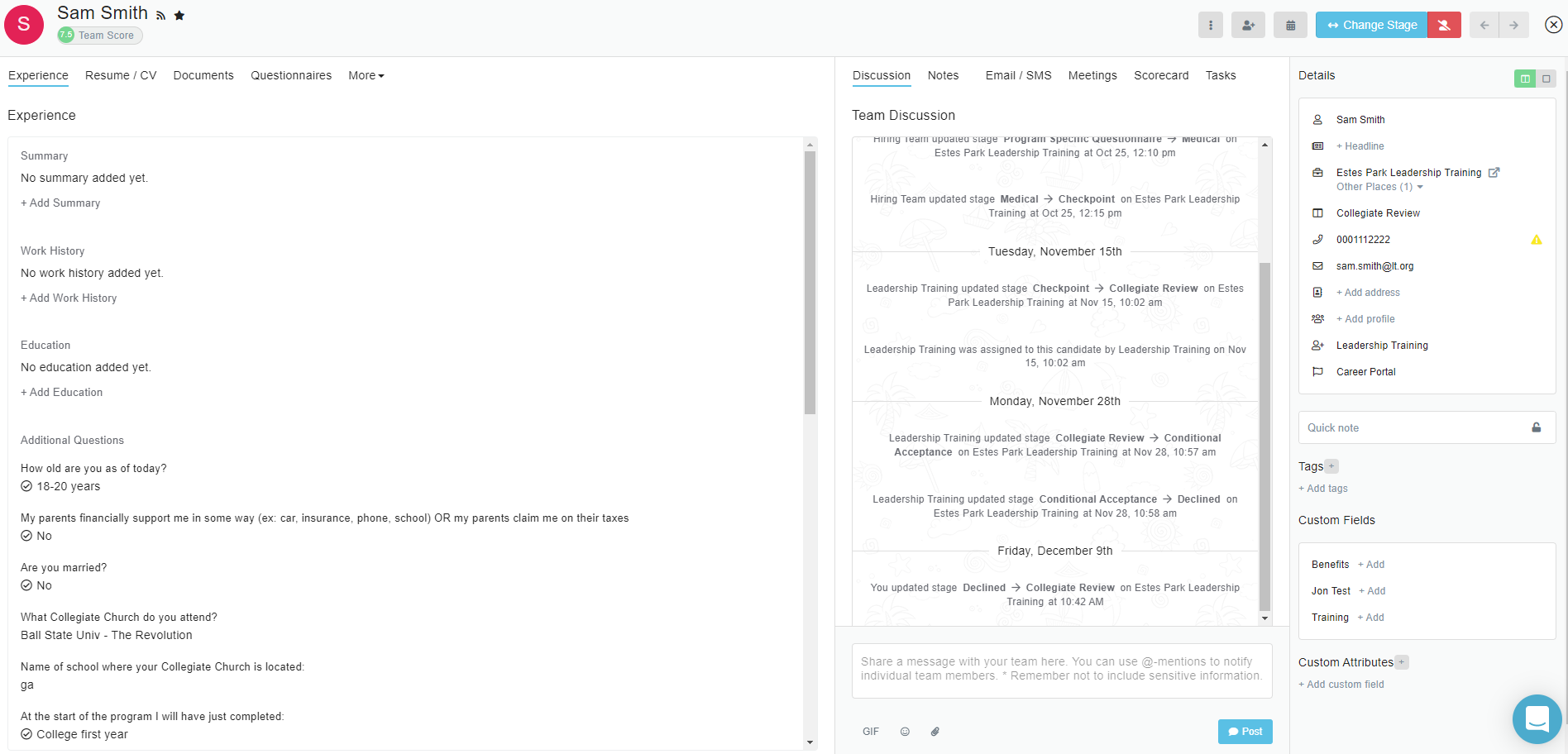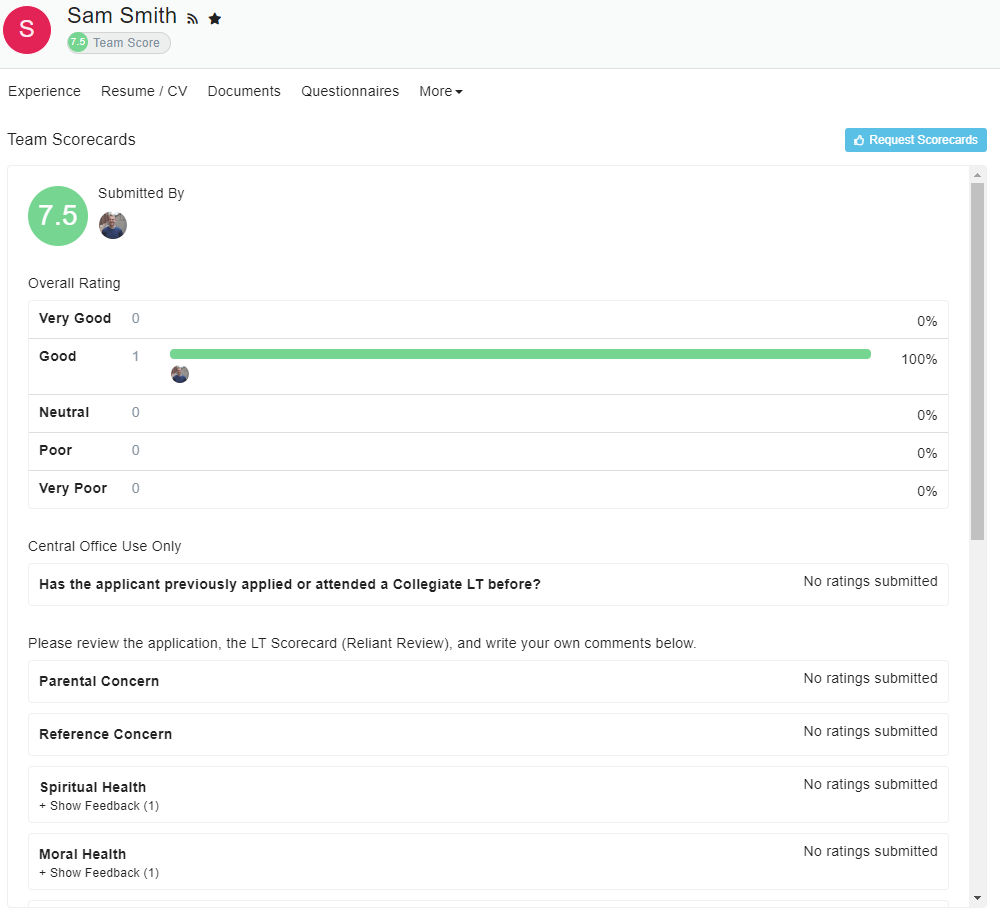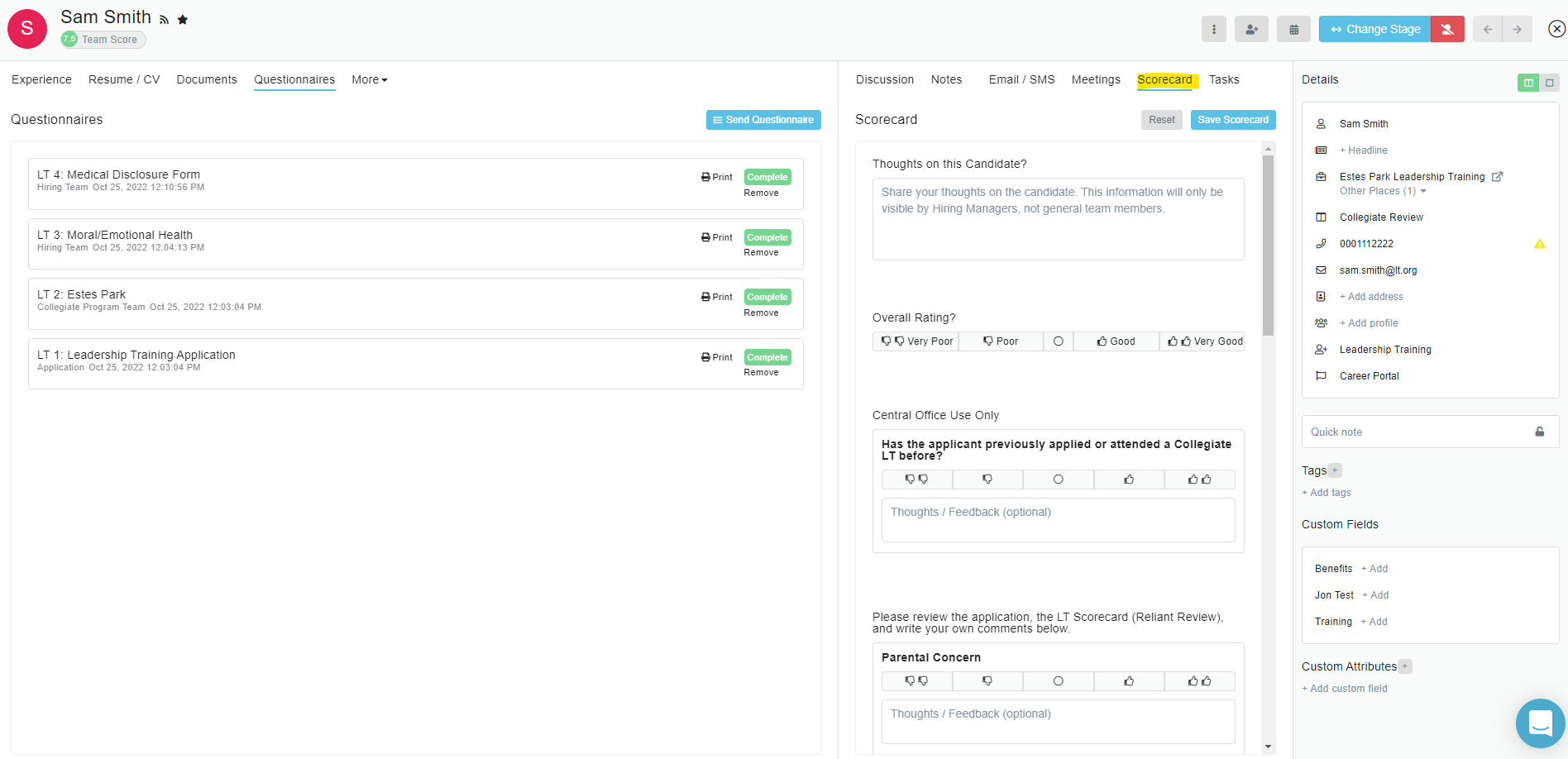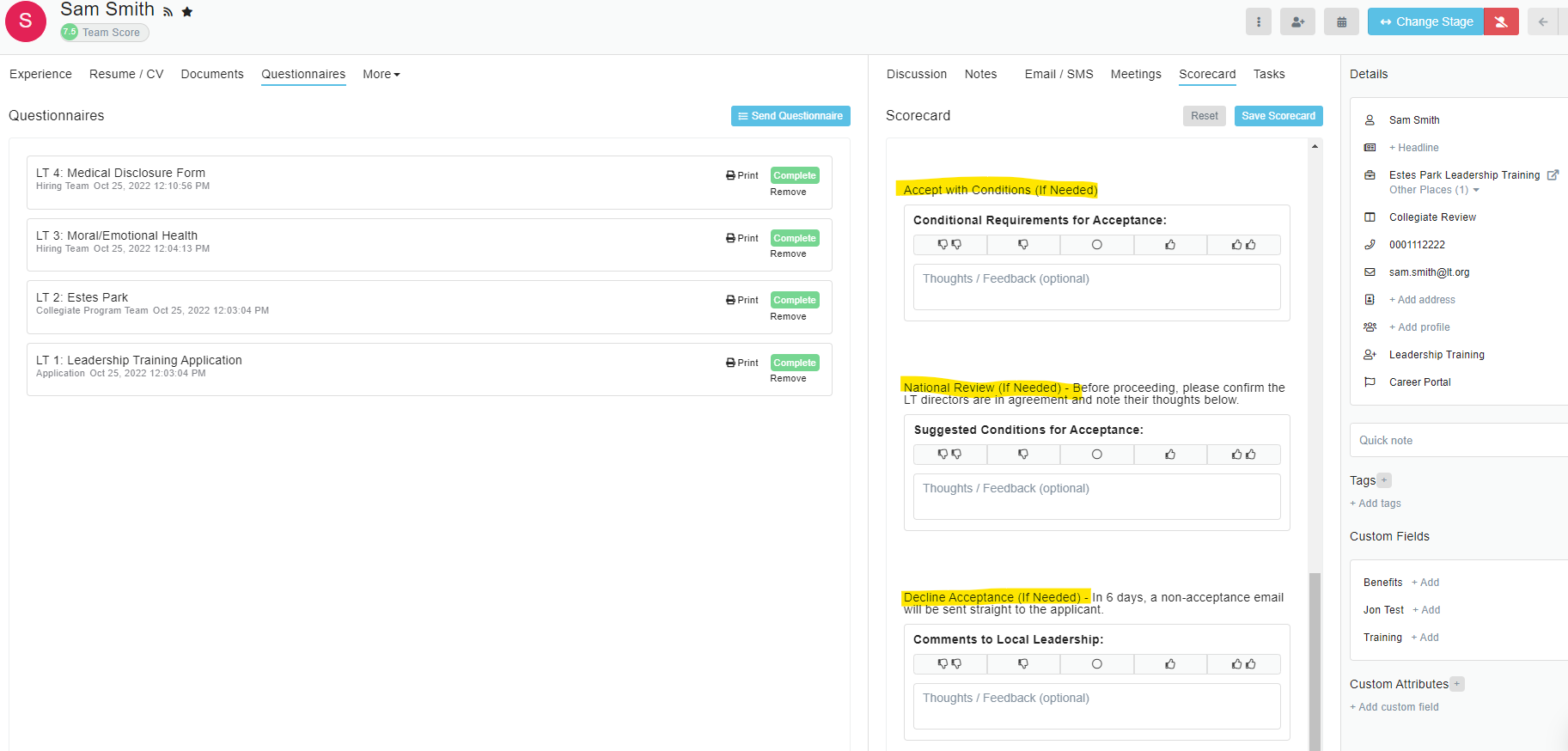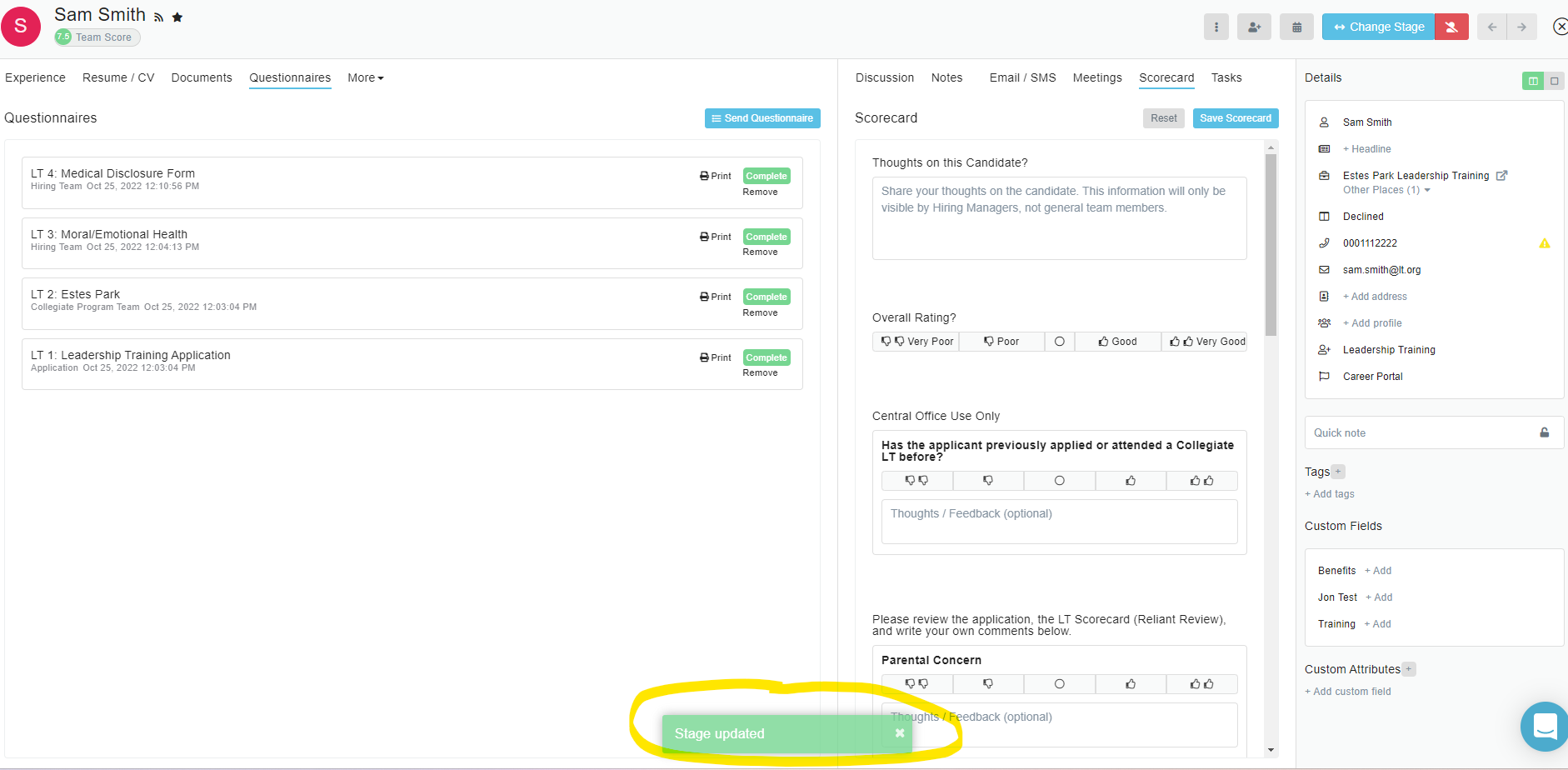LT Approval Workflow
The following is a description of the process that takes place once an LT applicant submits their application.
Our LT Assessments are in Breezy. There is one National Collegiate application for all LTs.
Once an applicant has finished filling out the application and their references have submitted their input, the review approval process for acceptance into the program begins. The workflow is as follows:
- Reliant Review (currently performed by the LT Admin, Caleb)
- If concerns are identified, it is passed on to the Collegiate Review
- If larger concerns are presented, it is passed on to National Review (currently performed by LT National Director (Chad Frank), Collegiate National Board member (Rick Keith), and Mike Swann (Reliant legal), if needed Dave Meldrum-Green and coordinated by Caleb Hayworth).
- We will need to keep records of conversations during this phase since it is not documented within Breezy.
- If serious concerns are listed, it goes to Counselor Review (currently filled out by one of the Collegiate Reviewers after discussion from the local church and then approval from National Review).
Reviews will result in either:
- Acceptance (each LT has a specific acceptance email)
- Conditional Acceptance
- Non Acceptance: LT Declination
- Someone may also choose to withdraw from LT
LT directors who are interested in what stage their participants are in can use a Collegiate LT - Breezy Reports to query the list.
Collegiate Review
The first step in the LT application process is for a Reliant Reviewer to be the first set of eyes on the application. This may be a Reliant employee or Reliant Central Staff.
Currently, the Reliant Reviewer role is assigned to Caleb Hayworth (Collegiate Systems Admin). If the Reliant Reviewer identifies areas of concern on the application, it will then be deferred to Collegiate Review stage for a second pair of eyes to read over the application.
At the Collegiate Reviewer Stage, the Collegiate Reviewer(s) should be reviewers for both the Collegiate Review stage as well as the Counseling Review stage. If there are multiple Collegiate reviewers, the first reviewer to begin the review of the applicant becomes the only one who can then finish the review of that applicant.
Collegiate Reviewer will be sent an email from Breezy from the Reliant Reviewer who found a concern on an LT Assessment.
- The Collegiate Reviewer will then log into Breezy and review the assessment.
- You can follow the steps in this video to do the review or view the step-by-step guide below.
Common conditions for Collegiate Review Acceptance include:
- For those struggling with substance abuse or sexual activity, the typical condition is that they refrain from doing those things beginning from the timing of their acceptance to LT throughout the duration of the program.
- The most common condition is to also ask them to meet with a staff member weekly for the first 5 weeks of the summer and then reassess (or bi-weekly throughout the summer) to help keep them accountable and to follow up with how they are doing.
Those conditions will be shared with the LT director through the LT Shepherding Document. The Shepherding google doc is used by Reliant and the LT directors to continue to review and receive updates on those that had concerns found on their LT assessment. The Shepherding google doc lists those that had conditions for acceptance and usually required staff follow-up throughout the summer. The director would then assign a staff accountability person to meet with the participant and hold the participant accountable during the program to the conditions that have been put in place. We suggest finding someone who has a shepherd's heart and also clearly identifies this as part of the role prior to the beginning of the program. If possible, have the staff member reach out to the participant before they arrive at the program to begin discussions and gain trust. The directors are responsible for assigning someone to update the shepherding google doc with how the follow-up is going to keep Reliant and Collegiate in the loop.
Concerns decided on a Collegiate level:
Those scenarios include, but are not limited to:
- Depression/anxiety (seeing a counselor and/or taking medication but it seems under control)
- Alcohol usage (habitual underage drinking and/or lack of seeing underage drinking as an issue)
- Sexual purity (continued issue and/or no accountability listed)
- Pornography/masturbation (continued issue and/or no accountability listed),
- Multiple concerns listed
- Spiritual reference is unaware of the struggles listed by the participant
- or the spiritual reference listed struggles that the participant did not.
We want to leave the final acceptance decision of these concerns in the hands of the Collegiate Reviewer and local pastor and LT director who will be with the participant all summer.
In general, we say that all self-harm concerns need to be brought to national review. When reviewing suicidal concerns, we ask that you inquire about 1) the date(s) of occurrence (if not already stated) and frequency of suicidal thoughts, and 2) whether have they had any suicidal thoughts since filling out the assessment. The heart behind this is related to how severe the past self-harm struggle was, how close to 6 months ago it occurred, do they still have suicidal thoughts, etc., and to show that we did our due diligence by having multiple eyes on it before acceptance.
However, if the Collegiate reviewer finds out after discussing with the local church leader that there are no current self-harm thoughts and a normal acceptance is recommended, then we do not need to present this concern to the National Reviewers. This would be only for those that Collegiate Reviews recommend as normal acceptance (no conditions at all for acceptance) because the self-harm (thoughts or actions) is no longer happening.
If self-harm is still somewhat still in the picture and they are recommending conditions, it would still need to come to a national review for more eyes to view the situation.
National Review
If the next step is a National Review, then the Collegiate Reviewer will first reach out to discuss the concerned applicant with the LT director(s). If they want to move forward, then the Collegiate Reviewer will tell them to make a note on their Breezy scorecard to move forward with National Review (see below).
Concerns decided on a National level:
In general, we say that all self-harm concerns need to be brought to national review. However, we have had a few national reviews where we uncover that they have struggled with suicidal concerns prior to 6 months ago. As a formality, we had said that all of those still needed a national review before moving forward. The heart behind that was related to how severe the past self-harm struggle was, how close to 6 months ago it occurred, do they still have suicidal thoughts, etc., and to show that we did our due diligence by having multiple eyes on it before acceptance.
However, if the Collegiate reviewer finds out after discussing with the local church leader that there are no current self-harm thoughts and a normal acceptance is recommended, then we do not need to present this concern to the National Reviewers. This would be only for those that the Collegiate Reviewer(s) recommend as normal acceptance (no conditions at all for acceptance) because the self-harm (thoughts or actions) is no longer happening.
If self-harm is still somewhat in the picture and they are recommending conditions, it would still need to come to a national review for more eyes to view the situation.
Those scenarios include, but are not limited to:
- severe depression/anxiety (hospitalized, panic attacks)
- any kind of self-harm/abuse (eating disorders, cutting, etc.)
- suicidal thoughts or attempts
- substance abuse (drunkenness, prescription drug abuse, etc.)
- illegal drugs
- sexual addiction
- multiple (more serious) concerns listed
- parental issues
Counselor Review
The next step after the LT National Review is the Counselor Review.
- The Reliant LT National Reviewer will move the applicant to Counselor Review in Breezy, and Breezy will notify the Collegiate Reviewer that a counselor "recommendation" is needed. (We use the word recommendation, but the counselor is not allowed to make an actual recommendation due to liability on their end. They can however assess how the applicant is doing, which will help us determine the next steps.) It will also email both the Collegiate Reviewer and the local church pastor with instructions asking them to let the participant know we would like them to receive a counselor review.
- The local church pastor will talk with the participant and give them the counselor review information, requesting the participant to ask a counselor for their recommendation and to send that recommendation to the Collegiate Reviewer.
- Once the Collegiate Reviewer has heard back from the counselor and the green light is given:
- Then the Collegiate Reviewer will make a note on the scorecard in the "Accept with Conditions" box and assign the applicant to Leadership Training.
- LT@reliant.org will be notified the applicant has been assigned and will send the conditional acceptance email.
- A safety plan (see below) is required for anyone accepted in a counselor review stage.
- If Collegiate Reviewer receives a reason to be concerned, you have the approval to decline the applicant.
- Move the applicant to the Declined stage and Breezy will send the applicant a declination email.
With an Event Assessment revealing concerns regarding suicidal thoughts, ideations, or past attempts, the National Reviewers may require (depending on the individual situation) as an additional condition - a counselor/therapist assessment before final acceptance. This may be required, even if the event director and Reliant are still in favor of moving forward toward acceptance.
As a potential condition for acceptance, Reliant would ask the applicant to sign a release waiver with their counselor/therapist. This waiver would then allow the Collegiate Reviewer (or both collegiate reviewer and local pastor) to be able to contact the counselor/therapist and get their thoughts and current assessment on their emotional stability (we cannot ask for their recommendation as that would be too much liability for them) on the applicant attending the program (or not). Reliant wants the collegiate reviewer to be on the waiver because we want to have the ability to contact the counselor/therapist to keep the lines of communication open over the entire course of the event if a follow-up conversation ever becomes necessary. However, Reliant would be open to allowing a local pastor to be that person listed on the waiver if the local pastor is also attending the program with the applicant and will continue following up with them.
The applicant’s acceptance approval by the Reliant National reviewers could be conditional on the participant signing the release waiver, thereby giving the program director/local pastor the ability to talk with the counselor/therapist. If the applicant does not want to sign the release waiver, then this may possibly be deemed an unwillingness to cooperate (which may possibly be construed that they are potentially hiding something) and Reliant may decide that it is not willing to accept them for liability reasons. If the counselor/therapist does not give a positive assessment of the applicant attending the program, then generally Reliant will not accept the applicant for the program.
If the counselor/therapist's current assessment does not show emotional stability for the applicant for attending the program, but the collegiate reviewer is still not convinced that the applicant should be accepted (even after talking to the counselor/therapist), then Reliant reserves the right to not accept the applicant.
In most cases, the applicant is already seeing a counselor. This is standard procedure for the counselor to talk to someone (we recommend the program director or if need be the local pastor) about their client. Once the participant signs the release the counselor is able to communicate with that person to discuss the current assessment with their client to attend the program over the summer.
If the participant is not seeing a counselor/therapist, then Reliant may ask that they go see a licensed counselor in order to move forward with our conditions for acceptance. But, we also understand that a counselor/therapist may not want to make an assessment after just one or two therapy sessions and Reliant will need to take that into consideration on how to move forward from there.
These types of scenarios will be treated on a case-by-case basis. Reliant may potentially move forward with provisionally accepting an applicant prior to the conditional acceptance criteria being completed. Reliant may do this with the caveat that we could still potentially withdraw initial acceptance from the applicant if after any condition(s) are met and we still later decide that the applicant should not attend the program. Reliant suggests that the local pastor at least have the applicant state that they are willing to move forward, with understanding this above condition, before Reliant officially accepts them. The final decision is left in the collegiate reviewer's hands to say if they would prefer that Reliant wait until the condition(s) have been fully met and discussed before moving forward. Or if the national reviewer feels comfortable, Reliant can move forward knowing we could potentially retract our acceptance at a later time.
Asking for Counselor's Assessment
Here are instructions for how to ask the event applicant for their counselor's assessment for a Reliant program: This would typically be sent to a representative from the local church leadership that the program applicant is from, that would then meet with the applicant and give them this information to pass on to the counselor.
The local church leadership would set up a meeting with the applicant and explain the following:
- Share with the applicant that we are excited for him/her to have this opportunity.
- Discuss that we want to make the program a success for them.
- Explain that there are some condition(s) that he/she needs to meet in order to be accepted.
- Explain to him/her the needed assessment from his/her counselor/therapist and how to obtain that (see instructions below).
- Explain that we will need to wait for the collegiate reviewer to review the counselor's assessment before we move forward.
- Explain to them that if he/she is conditionally accepted, one of the conditions is generally to meet with a staff member for # of weekly meetings for check-in, accountability, and to care for him/her.
- There may also be a request to continue counseling remotely with their counselor or to meet with a local counselor during the program.
- After the meeting, respond back to the collegiate reviewer with how the meeting went, and if he/she agrees to those condition(s).
Reliant needs a current assessment and safety plan by the counselor/therapist stating that their client (the applicant) is currently emotionally stable. We would also like for the counselor and applicant to create a safety plan that can be shared with Reliant and the program.
The applicant, as the client, would need to sign a release waiver with their counselor for the collegiate reviewer to be able to interact with the counselor. Once he/she signs the release waiver, the counselor is able to communicate with the program director (via email or mail) with their assessment. Email or a letter would be best in order for the director to have the assessment in writing. If we can get this ASAP, that would be great! We do not need to know any private personal information about what he/she is discussing in counseling. Just whether or not the counselor feels they are currently emotionally stable. Let them know that they can also contact the program director with questions.
Letter from Counselor/Therapist
If the counselor does not specifically state that the written assessment to the collegiate reviewer may not be forwarded or shared, then Reliant would like to have a copy of the assessment to keep for their records. Thus, if the counselor notes that this may only be shared with the collegiate reviewer, then Reliant will put the decision in the collegiate reviewer's hands to make the decision as to whether or not they recommend acceptance of the applicant based on the counselor's assessment (as not to break the confidentiality agreement). If the collegiate reviewer sees any reason based on the counselor's assessment, not to accept the applicant, then the collegiate reviewer would need to make the decision to not accept the participant.
This is a sample letter of support from a counselor. It was written and discussed together with the program participant needing a counselor's assessment to show that the participant also agrees with the content within the letter.
Dear [Name of Collegiate Reviewer],
[Participant Name] has participated in [#] of mental health therapy sessions with me since [start date]. [Participant Name] attends weekly therapy to address managing [list of concerns: anxiety, depression, suicidal thoughts, etc.] During [Participant Name] time in therapy he/she has worked on developing healthy coping skills such as journaling, positive imagery, challenging irrational thought patterns, setting boundaries, assertive communication, mindfulness calming/relaxation techniques, and healthy emotional awareness and expression. [Participant Name] plans to attend weekly therapy for the remainder of the spring semester [year] with [Name of Counselor and Counseling Group].
At this time, [Participant Name] denies active suicidal ideations and denies active thoughts to self-harm. He/she agrees to seek help and communicate with support systems if thoughts of suicide or self-harm arise.
The following is a list of support people to contact:
[Name of friend]
[Name of family member]
[Participant Name] agrees to practice daily self-care for him/her mental health by engaging in the following activities: journaling, prayer, listening to music, being around friends, being outdoors-taking walks. [Participant Name] also plans to meet with program staff during the summer program to check in.
[Participant Name] was provided with crisis contact information: 1-800-273-TALK (the national suicide prevention lifeline), where she/he can access local crisis counselors. [Participant Name] agrees to contact crisis counselors and/or go to the nearest emergency room if needed during the summer program if she/he presents with a mental health crisis.
Sincerely,
[Name of Counselor and Participant Name]
All participants with suicidal concerns that are accepted into the program are required to fill out this safety plan. A copy of this plan will be given to the participant, the event directors, the program leader assigned to meet with the participant (if different than a program director), and Reliant.
CONDITIONS FOR SUICIDAL CONCERNS
- The most common condition for all applicants in the counselor review is to also ask them to meet with a staff member bi-weekly during the summer to help keep them accountable and to follow up with how they are doing.
- For those participants that have severe emotional struggles, we also suggest that a follow-up takes place with the participant (preferably around 2 weeks before the event) to confirm that their condition has not negatively changed and to receive any updates to help us prepare to care for the participant better during the program.
- We also ask the applicant to turn in a safety plan.
After a participant with a concern of suicidal thoughts is accepted into the program, the conditions below are for the event director to follow. These are Reliant's normal protocols for suicidal concerns once the participant has been accepted.
- Review the shepherding google doc and safety plan for the participant. The safety plan will be located in the one-drive safety plan folder.
- Arrange weekly meetings with a program leader that is a mature, seasoned leader who has had experience with suicidal discussions. Make sure the leader knows who to contact and what questions to ask if the concern heightens.
- Have that leader meeting with the participant update a document (shepherding google document) with details from the weekly discussions (or they can update the event director who can then update the document) that is shared with the event leaders and Reliant. We want to have everything in writing to show that we have done our due diligence in caring for this individual appropriately.
- Request that they meet with a counselor on-site at the program if at all possible.
Counseling during the program
Many counselors can not continue meeting with their clients during the program if they are attending a summer program out of state because when they cross state lines they do not have a license to practice counseling in that state. However, there are some counselors who do allow for FaceTime meetings or phone calls. If the participant can continue meetings with their counselor over the summer we highly recommend that they continue meeting.
Estes Park Center- YMCA
For Estes Park LT: On-site pastoral counseling- free of charge to YMCA employees at the Leggett Christian Center. Can ask students to do weekly meetings.
Silver Bay- YMCA
For Adirondack LT: On-site chaplain at the YMCA (Bruce Tamlyn) is also a certified counselor.
Snow Mountain Ranch-YMCA
Some program locations, such as the YMCA of the Rockies - Snow Mountain Ranch (Reliant's LT summer program in Winter Park, Colorado) offer counseling services available to their staff (all LT program participants are hired by the YMCA so they would all have this resource at this program location).
For this summer program, any participant could access Mind Springs Health - Granby, CO during their Open Access hours to initial treatment/therapy.
https://www.mindspringshealth.org/treatment-services/locations/granby/
Reliant's usual condition for any emotional and psychiatric concerns is to require the participant to meet with summer program leadership staff for a certain number of weeks over the summer to check in and see how they are doing. Typically the summer program leadership staff that is meeting with the participants is not a licensed counselor. Because of this, Reliant recommends the local summer program leadership review the information below to become familiar with what constitutes an involuntary commitment/mandatory treatment for a person to receive emergency psychiatric care (often resulting in hospitalization) if necessary. This is only if the person themselves does not voluntarily admit themselves and is deemed a danger to themselves (typically in the case of thoughts of suicide or self-harm.) We want to make sure the program leadership is aware that they may need to contact law enforcement if ever such an occasion should arise.
Here is the link for Colorado: https://www.treatmentadvocacycenter.org/browse-by-state/colorado
Here is the link for New York State: https://www.treatmentadvocacycenter.org/browse-by-state/new-york
National Suicide Prevention Lifeline: 1-800-273-TALK to access local crisis counselors.



